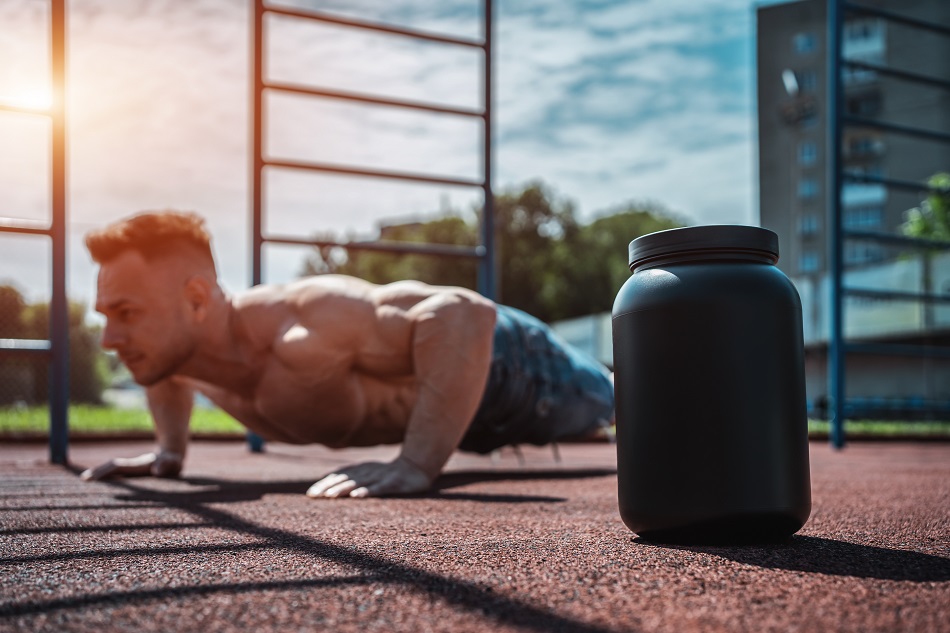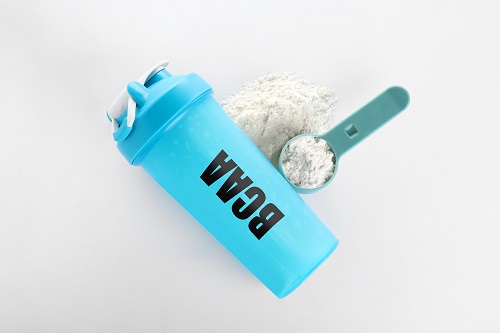
Introduction
Due to constant research and the steady evolution of the fitness world, branched-chain amino acids (BCAAs) supplements are starting to become popular. Their benefits provide an explanation as to why gym-goers and athletes now consider them a necessity.
But what exactly are BCAAs? What benefits do they provide? How and when do you use them? Do they have side effects, and what exactly are they made of?
Well, through meticulous research, and with the help of certified nutritionists, we have provided answers to these questions.
What are BCAAs?
Generally, there are 20 amino acids your body uses to synthesize proteins, and of those 20 amino acids, nine cannot be made by themselves. Hence, you need certain foods to acquire them.
Three of those nine amino acids, leucine, isoleucine, and valine, together constitute BCAAs. When it comes to maintaining all-important muscle mass, muscle recovery, and reducing fatigue, these three are the important ones.
Although these BCAAs are found in foods, which we will discuss later, they can also be made available in supplement form as both pills and powders.

Five Benefits of BCAAs
Of course, BCAAs are great for muscle development. However, unknown to most people, BCAAs provide more benefits to your physique and health. Here are five major benefits of BCAAs you should expect.
- Increase in muscle growth – lean muscle
Without doubt, BCAAs are useful for increasing lean muscle growth. Of the three BCAAs, leucine is what mostly does the job. Leucine is the key BCAA required for muscle protein synthesis and the prevention of muscle catabolism, preventing the breakdown of muscle tissue.
According to Andres Ayesta, RDN, a certified strength and conditioning coach who founded Planos Nutrition, leucine is responsible for “turning the switch on” for the body to produce more proteins that promote muscle tissue repair and growth.
Whether consuming BCAAs through diet or through taking supplements, their biggest attraction for many is their role in promoting muscle growth, although rate of such growth is also dependent on other factors.
- Boosts energy and reduces exercise fatigue
BCAAs are known through research to reduce fatigue and boost energy during exercise. Since more muscles mean a faster metabolic rate, you need BCAAs to boost your energy. But how does this work?
During exercise, BCAAs block the level of tryptophan (an amino acid that converts to serotonin in the brain). Serotonin has been linked to mental fatigue and by reducing l-tryptophan activity in the brain, mental fatigue is delayed. This process of reducing serotonin levels means you can exercise for longer periods.
- Muscle recovery and soreness
Another advantage of BCAAs is that they help reduce muscle soreness. Usually, after an intense workout or a routine you are not used to, your muscles start to feel sore, and this can continue for up to 72 hours after the workout. This is referred to as delayed onset muscle soreness (DOMS).
Research has shown that supplementing your diet with BCAAs before a workout can help reduce muscle damage by decreasing the rate of muscle breakdown and boosting how quickly muscles can repair themselves.
Although research on BCAAs tends to be inconsistent, research done in 2012 on males carrying out strength developing exercises proved that consuming BCAAs before an intense workout helps reduce muscle soreness. Do not forget that taking your BCAA supplement before exercise is more effective at reducing DOMS than taking it post-workout.
- Weight loss benefits
When it comes to weight loss, BCAAs could help with this in several ways. Generally, the more muscle mass you have, the more calories you burn due to having a higher metabolic rate, and since BCAAs already help maximize muscle mass, this works hand in hand.
Likewise, according to Nick Mitchell, CEO and founder of Ultimate Performance, supplementing your diet with leucine has been shown to help overweight subjects on a hypocaloric diet. While on a hypocaloric diet, losing muscle alongside fat is hard to avoid. In this case, BCAAs can help maintain muscle and performance while still losing fat.
Similarly, since BCAAs can help regulate sugar levels by reducing the user’s need for a sugar fix and cravings for processed foods and drinks that are high in sugar, thereby ultimately preventing additional weight gain.
- Reduces muscle loss
BCAAs can come in handy to prevent muscle loss or wastage. For people suffering from chronic infections that cause a rapid loss of weight, supplementing their diet with BCAAs can reduce the rate of muscle loss.
To understand how it works, you must first know that muscle proteins are constantly being broken down and then rebuilt (protein synthesis). The balance between protein breakdown and synthesis is dependent on the amount of protein intake.
Where protein breakdown exceeds muscle protein synthesis, muscle wasting/loss starts to occur, and this is why you need BCAAs to help replace the necessary proteins.
This same principle is useful for people dieting or fasting and who do not want to lose muscle.
How and when to use BCAAs
Although BCAAs can be taken at any time during the day, it goes without saying that there is an optimal nutritional time to take them. As the rate of protein synthesis is greatest following a workout, the most effective time to take BCAAs is between 15 to 30 minutes before the workout.
The right timing is also based on what your reasons are for taking BCAAs. If you need them to reduce fatigue and as fuel to improve performance during exercise, you should take them pre-workout. These effects have been observed through the prolonged athlete performance of athletes in the field.
Similarly, a large proportion of athletes that use BCAAs take them to reduce DOMS after a workout. For these people, taking BCAA supplements pre-workout is more effective at reducing DOMS than taking them post-workout.
However, where muscle gain is the goal, taking BCAAs post-workout might be better for you. Leucine promotes protein synthesis better when taken post-workout, and this leads to muscle gains.
As much as the timing of BCAA supplement dosage matters, knowing how to use them is equally important. For increasing muscle recovery and DOMS, you need a dose of more than 7+ grammes. How quickly your muscles recover could be dependent on your BCAA dosage.
On the other hand, to benefit performance and reduce fatigue, smaller dosages may be effective, although the muscle recovery benefits will be sacrificed. To increase performance alone during exercise, approximately 4 grammes will be sufficient pre-workout.
For muscle development, taking about 5–8 grammes will suffice.
Possible side effects of BCAA supplements
Generally, using BCAAs will not be detrimental to your health and there will be nothing to worry about, and provided you use the product according to the manufacturer’s guidelines they should be safe to include in your nutrition.
A common misconception about BCAAs is that they make you gain unnecessary weight. This is untrue. Since BCAAs are usually low in calories, they could only make you lose weight, if taken correctly. For vegans, it is recommended to check the ingredients of the BCAA product before consuming it.
However, the science surrounding BCAAs is still uncertain, and some research suggests that BCAA supplements might be linked to certain diseases, including diabetes, liver problems, cancer, heart problems, nausea, diarrhoea, etc.
Since the United Kingdom has regulations for supplements, they should be safe. Nonetheless, always make sure to purchase from a reputable brand.
Best dietary sources of BCAAs
Although BCAA supplements come as powder or pills, they are made from a composition of several protein-rich foods containing the three branched-chain amino acids. Also, while some BCAA supplements are animal-based, others are plant-based. The best dietary sources include:
- Chicken
- Eggs
- Cottage Cheese
- Fish (tuna or salmon)
- Turkey
- Beans/peas/lentils
- Soy products
- Nuts/seeds
- Milk/yoghurt
Why do MMA fighters need BCAAs?
Although BCAAs already provide MMA fighters with better performance, muscle recovery, muscle increase, etc., it offers them other unique benefits.
Firstly, since weight classes are used in MMA, fighters’ bodies can only take a limited number of calories. During training or competitions, fat and (stored) carbohydrates are burnt up as fuel. However, due to the intensity that goes along with MMA, their bodies will next turn to protein as fuel. Hence the usefulness of BCAAs intake.
Also, due to the need to make weight, BCAAs assist fighters in cutting weight. BCAAs have been shown to help lower overall body weight by lessening body fat percentage. It therefore allows fighters to lose weight without compromising their performance.
FAQs
How often should I take them?
To see the results of BCAAs, you need to take them regularly. Make sure to use BCAA supplements every day you work out (mostly lifting days), and to do this for over ten days consistently. Although you can take BCAAs throughout the day, the most effective time is either shortly before your workout or post-workout, depending on your personal requirements. Don’t forget, timing matters!
What’s the difference between BCAAs and protein powder?
Protein powders contain the amino acids making up proteins, whereas BCAAs are made from three isolated amino acids: leucine, isoleucine, and valine.
While BCAAs are generally more effective when taken pre-workout, protein powders are superior for muscle development, protein balance, and muscle recovery when taken post-workout. Also, BCAAs are lighter on the stomach.
Are BCAAs good for vegans?
Since several BCAAs are completely plant-based (also some BCAA supplements are animal-based, it is recommended to check the ingredients of the BCAA product before consuming it), vegans have no problems with taking them. In fact, plant-based BCAAs are highly recommended.
Are BCAAs good for athletes?
BCAAs are particularly great for athletes. BCAAs have been shown to increase performance during exercise such as running, cycling, cardio, etc. Similarly, it helps reduce stress and fatigue.